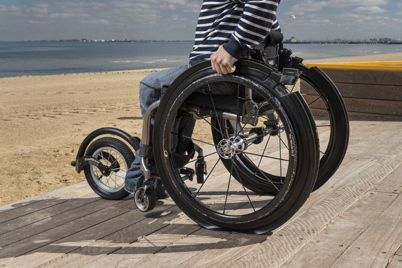MarinaTex is a bioplastic made of organic fish waste ordinarily destined for landfill or incineration and locally sourced red algae. It is a translucent and flexible sheet material, making it an ideal alternative material for single-use packaging. While it may look and feel like plastic, its similarities end there. Using a unique formula of red algae to bind the proteins extracted from fish waste, MarinaTex has strong overlapping bonds giving it strength and flexibility. The material is relatively resource-light, requiring little energy to produce. It biodegrades after four to six weeks, is suitable for home composting and does not leach toxins, removing the need for its own national waste management infrastructure. As MarinaTex uses byproducts from the fishing industry, it also helps to close the loop of an existing waste stream for a more circular product lifespan. According to Lucy, one Atlantic cod could generate as much organic waste needed to make 1,400 bags of MarinaTex.
Sir James Dyson, Founder, said: “The James Dyson Award received some thought-provoking ideas this year – and more female entrants than ever – making the judging very difficult. Ultimately, we decided to pick the idea the world could least do without. MarinaTex elegantly solves two problems: the ubiquity of single-use plastic and fish waste.”
As international winner Lucy will receive £30,000. Lucy aims to commercialise her invention sustainably, using her award money for further research into how MarinaTex can become a global answer to the abundance of plastic waste while still harnessing local solutions.
Lucy said: “I’m so delighted that MarinaTex has been recognised by the James Dyson Award. The invention is still in its infancy and I never thought it would make it to this stage, so it’s really encouraging to have the potential of the material acknowledged by such a prestigious award. I’m excited to now have the chance to undertake further research and development to explore all of the possible uses of MarinaTex, taking into account form, function and footprint.”
The Runners Up
Gecko Traxx, Ryan Tilley, RMIT University, Sydney (Australia)

Most coastlines are inaccessible to manual wheelchair users. To solve this problem this year’s James Dyson Award international runner up Ryan Tilley invented Gecko Traxx, a portable and affordable manual wheelchair accessory that enables off-road access. The unique tyre cross-section is unobtrusive when fitted to the wheelchair and expands when in contact with the ground, increasing the contact surface area by three times when needed. The simple, integrated clip can be used even with limited dexterity and enables the individual to fit the tyres to their wheelchair independently without the need to transfer out of the wheelchair.
Afflo, Anna Bernbaum, Dyson School of Dyson Engineering, Imperial College London (UK)

Asthma is a condition that makes breathing difficult in response to external triggers. After interviewing patients at leading London (UK) hospital and conducting an online survey, Anna found that the major gap in asthma management today is trigger identification. Afflo is an AI-enabled wearable device that monitors asthmatic symptoms and predicts triggers, allowing users to make data-driven decisions about their asthma management. Afflo collects respiratory audio signals through a specialised microphone and pairs this with environmental information – collected via sensors and online data sources. The system can predict each patient’s unique trigger pattern, and a machine learning algorithm analyses the two streams of data in the cloud. The results are presented back to the user through the Afflo app, allowing them to make lifestyle decisions and minimise future symptoms.



Diese Seite auf [ ] teilen